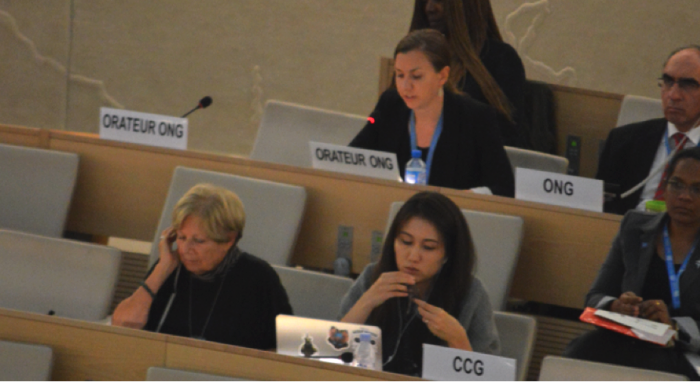The Universal Period Review (UPR) – a mechanism through which the human rights situation in each UN member State is examined by its peers – is essential for civil society to obtain recommendations for national level advocacy and apply pressure for human rights change on the ground. In a statement at the 35th session of the Human Rights Council, ISHR called for increased civil society participation, a stronger focus on implementation of recommendations and enhanced action to combat reprisals associated with the UPR.
Civil society participation
‘Civil society is not only necessary for developing recommendations, but is essential for the working towards the implementation of these recommendations. The role of civil society must therefore be protected and enhanced’, said ISHR Programme Coordinator and Legal Counsel Tess McEvoy.
The United States of America echoed the call for increased civil society participation during the debate. The USA noted that ‘civil society provides an alternative perspective to the narrative of States through their independent data collection and first hand testimonies by victims of human rights abuses. Civil society should be able to organise side events on the margin of UPR working group presentations, and participate in UPR briefings without the fear of harassment, intimidation or reprisals whether at home or abroad.’
Strengthened implementation of UPR recommendations
While recommendations received are often accepted, implementation of these recommendations on the ground remains patchy. ISHR’s statement called on States to ensure greater follow-up to, and implementation of, recommendations. It also highlighted the key role of the OHCHR in maintaining a focus on implementation.
‘The Item 6 debate provides a perfect opportunity for dialogue on implementation. States should use the Item 6 General Debate to update the Council on implementation of recommendations previously received, and seek information on implementation of recommendations previously made’, said McEvoy.
Responding to reprisals
Alleged cases of intimidation and reprisals of human rights defenders engaging or seeking to engage in the UPR have escalated. ISHR received reports of cases in Egypt, India and Venezuela in the past year. Ongoing reprisals in Bahrain are particularly concerning, including the imposition of travel bans on 27 defenders during the 27th UPR pre-session – including Sayed Hadi Al Musawi – as well as the interrogation of Abtisam Alsayegh in relation to her UN engagement.
ISHR’s statement reiterated calls for States to ask advance questions, and make recommendations about the prevention, investigation, prosecution and remediation of reprisals.
‘Reprisals against human rights defenders for their engagement with the UPR remain worryingly prevalent,’ said McEvoy. Given civil socity’s fundamental role in the UPR, we call on the President, Bureau and Secretariat to establish an institutionalised reprisals mechanism to prevent, investigate, remedy and promote accountability for reprisals associated with the UPR’, McEvoy continued.
These calls form part of ISHR’s broader strategy to strengthen the UPR which can be accessed here.
Contact: Tess McEvoy, Programme Coordinator and Legal Counsel, and focal point for ISHR’s UPR advocacy, on: [email protected].




